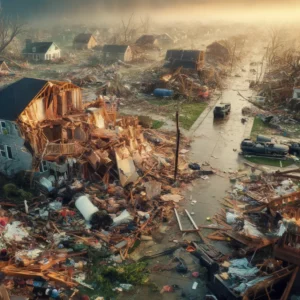Tremors in the Legal Landscape
A 4.4 magnitude earthquake recently shook Los Angeles, reverberating through the city’s physical and legal infrastructure. This seismic event near Highland Park has sparked discussions about earthquake preparedness, property rights, and potential liabilities in one of America’s most earthquake-prone regions.
5 Key points
- Recent 4.4 magnitude Los Angeles earthquake highlights legal vulnerabilities
- Property damage can lead to complex insurance claims and landlord-tenant disputes
- Building code compliance and retrofit requirements gain renewed focus
- Earthquake preparedness has legal implications for businesses and property owners
- Understanding rights and responsibilities is crucial for navigating the post-quake legal landscape
Assessing the Impact
While moderate in magnitude, the recent Los Angeles earthquake has sparked discussions about potential legal consequences. Although no extensive damage was immediately reported, the event serves as a reminder of the region’s seismic vulnerability and the need for proper preparedness.
Specific impacts of this earthquake include:
- Widespread shaking felt across the Greater Los Angeles area
- Water spewing from the side of Pasadena City Hall, as observed by news helicopters
- Activation of the LAFD’s “earthquake mode” for comprehensive district surveys
- Temporary disruptions to daily activities and business operations
- Increased public awareness and concern about earthquake preparedness
Property Damage Considerations
Property damage can lead to complex legal situations after an earthquake. Homeowners and businesses may navigate insurance claims, lease agreements, and potential disputes with neighbors over shared walls or fences damaged during the quake.
Common types of earthquake damage include:
- Structural damage to buildings (cracks in walls, foundations, or roofs)
- Broken windows and damaged facades
- Collapsed chimneys or unreinforced masonry
- Damage to utilities (water pipes, gas lines, electrical systems)
- Destruction of personal property inside buildings
- Landscape damage (sinkholes, land shifts, fallen trees)
- Road and infrastructure damage (cracked pavements, bridge stress)
Each of these damage types can lead to specific legal considerations, such as:
- Determining liability for repairs in multi-unit dwellings
- Assessing the impact on property values and disclosure requirements for future sales
- Navigating disputes with insurance companies over coverage and claim amounts
- Addressing safety concerns and potential code violations revealed by the earthquake
Insurance Coverage and Claims
The Los Angeles earthquake underscores the importance of earthquake insurance. Many standard homeowners’ policies do not cover earthquake damage, leaving property owners vulnerable to significant financial losses. Legal issues may arise if insurers dispute claims or coverage limits prove insufficient.
Key insurance considerations include:
- Separate earthquake insurance policies and their specific terms
- Coverage limits and deductibles, which are often high for earthquake policies
- Exclusions and limitations in policies (e.g., land movement, pre-existing damage)
- Timely filing of claims and documentation requirements
- Disputes over the cause of the damage (earthquake vs. pre-existing conditions)
- Additional living expenses coverage for temporary relocation
Landlord-Tenant Disputes
Earthquakes can strain landlord-tenant relationships. Questions of habitability, repair responsibilities, and rent abatement may surface, potentially leading to legal conflicts. Both parties should know their rights and obligations under California law in case of earthquake damage.
Potential areas of dispute include:
- Responsibility for repairs and the timeline for completion
- Rent reduction or suspension during periods of uninhabitability
- Termination of lease agreements due to extensive damage
- Liability for tenant injuries caused by earthquake damage
- Disputes over security deposits and their use for repairs
- Compliance with local ordinances regarding tenant relocation assistance
Building Code Compliance
The recent tremor may prompt a reassessment of building code compliance. Property owners could face legal challenges if their structures are non-compliant with current seismic safety standards. This Los Angeles earthquake serves as a reminder of the ongoing need for seismic retrofitting and adherence to building codes.
Key compliance issues include:
- Mandatory retrofit programs for vulnerable building types (e.g., soft-story structures)
- Updated seismic design requirements for new construction
- Disclosure obligations regarding a building’s seismic risk and retrofit status
- Potential fines or legal action for non-compliance with retrofit ordinances
- Liability considerations for injuries or deaths resulting from code violations
Economic Ripple Effects: Business and Legal Considerations
The recent Los Angeles earthquake is a stark reminder of the potential economic disruptions that seismic events can cause. These disruptions often have far-reaching legal implications for businesses, employees, and the broader economy.
Business Continuity and Contractual Obligations
Earthquakes can significantly impact a company’s ability to fulfill its contractual obligations. Force majeure clauses may come into play, which excuse parties from performing their contractual duties due to unforeseeable circumstances. However, their applicability can be subject to legal interpretation and dispute.
Key considerations include:
- Review of existing contracts for force majeure provisions
- Potential liability for breach of contract due to earthquake-related disruptions
- Negotiation of contract modifications or extensions in light of seismic events
- Insurance coverage for business interruption and related losses
Employment Law Challenges
Earthquakes can create complex employment law scenarios. Businesses may face legal questions regarding the following:
- Obligations to pay employees during earthquake-related closures
- Workplace safety requirements in the aftermath of a seismic event
- Accommodations for employees affected by earthquake damage or trauma
- Potential workers’ compensation claims for earthquake-related injuries
Supply Chain Disruptions
Seismic events can cause significant supply chain disruptions, leading to potential legal disputes over delayed or unfulfilled orders. Businesses may need to navigate:
- Contractual liabilities for supply chain failures
- Alternative sourcing arrangements and their legal implications
- Intellectual property concerns when seeking alternative suppliers
- International trade law issues for global supply chains affected by local earthquakes
Real Estate and Property Valuation
Earthquakes can have lasting effects on real estate markets, potentially leading to legal challenges related to:
- Property valuation disputes for tax or sale purposes
- Disclosure requirements for earthquake damage in real estate transactions
- Zoning law changes in response to identified seismic vulnerabilities
- Eminent domain issues for properties required for public safety improvements
By understanding these economic and business impacts, individuals and companies can better prepare for the legal challenges that may arise from seismic events like the recent Los Angeles earthquake.
Earthquake Preparedness: A Legal Perspective
While not directly tied to legal ramifications, earthquake preparedness is crucial for minimizing potential liabilities. The California Department of Public Health’s “Drop, Cover, and Hold On” protocol is essential knowledge for residents and can help prevent injuries and subsequent legal issues.
Legal aspects of preparedness include:
- Employer obligations to maintain safe workplaces and emergency plans
- School and childcare facility responsibilities for student safety during earthquakes
- Liability considerations for event organizers and public space managers
- Compliance with regulations requiring emergency supplies and equipment
- Legal implications of ignoring evacuation orders or official warnings
Looking Ahead: Legal Preparedness for Future Quakes
This Los Angeles earthquake, though moderate, highlights the need for legal preparedness in seismically active regions. Property owners, tenants, and businesses should review their insurance policies, understand their rights and responsibilities, and consider consulting with legal professionals to ensure they’re protected in a more severe earthquake.
Steps for legal preparedness:
- Review and update insurance policies regularly
- Understand local building codes and retrofit requirements
- Develop and maintain comprehensive emergency response plans
- Stay informed about changes in earthquake-related laws and regulations
- Consider pre-established agreements with contractors for post-earthquake repairs
- Maintain detailed inventories of property and assets for potential claims
- Establish clear communication protocols with tenants, employees, or customers regarding earthquake procedures
By taking these proactive steps, individuals and businesses can better navigate the complex legal landscape that often follows significant seismic events in areas like Los Angeles.
FAQ
Q. Does my standard homeowner’s insurance cover earthquake damage?
A. Most standard homeowners’ policies do not cover earthquake damage. Separate earthquake insurance is typically required for comprehensive protection.
Q. Can I be held liable if my property damages a neighbor’s during an earthquake?
A. Generally, natural disasters like earthquakes are considered “acts of God,” limiting liability. However, if negligence in maintaining your property contributed to the damage, you could be held responsible.
Q. What are my rights as a tenant if my rental becomes uninhabitable after an earthquake?
A. California law protects tenants in uninhabitable dwellings, including the right to withhold rent or terminate the lease if the landlord fails to make necessary repairs within a reasonable timeframe.
Q. Are businesses required to have earthquake emergency plans?
A. While not always legally mandated, having an earthquake emergency plan is strongly recommended and can help mitigate potential employee and customer safety liabilities.
Q. How soon after an earthquake should I file an insurance claim?
A. It’s advisable to file a claim immediately after discovering earthquake damage. Prompt reporting can help expedite the claims process and prevent disputes over the cause of damage.
Citations:
Schlepp, T. (2024, August 12). 4.4 magnitude earthquake rattles Los Angeles and beyond. WATE. https://www.wate.com/news/national/4-4-magnitude-earthquake-rattles-los-angeles-and-beyond/







